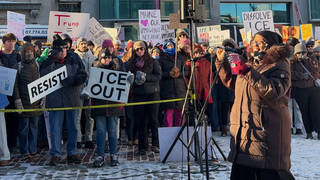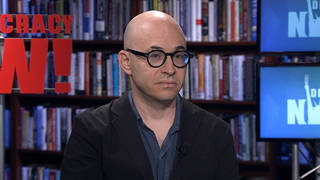
Israel is intensifying its war on Iran, bombing the headquarters of the country’s national TV network on Monday and assassinating another top military leader. Israeli Prime Minister Benjamin Netanyahu has also suggested killing Iran’s supreme leader, Ayatollah Ali Khamenei. Iran has responded with barrages of long-range missiles targeting Israel. Meanwhile, U.S. President Donald Trump has shown little interest in containing Israel’s assault, posting on social media that “everyone should immediately evacuate” the capital Tehran.
“How can a city, a metropolis of 10 million people, suddenly evacuate? And to where?” says Iranian American journalist Negar Mortazavi. She notes that while Iran has long insisted its nuclear program is civilian in nature, these attacks could push the leadership into militarizing it and pursuing nuclear weapons.
We also speak with Israeli political analyst Ori Goldberg, who says the war on Iran has allowed Israel’s establishment to “draw the world’s attention away from Gaza,” countering rising domestic and international criticism. “Netanyahu felt the global sentiment shifting … and because of that, he attacked Iran.”
Transcript
AMY GOODMAN: Israel bombed the headquarters of Iranian state television Monday in the latest escalation of Israel’s five-day war. Israel also assassinated another top Iranian official: Iran’s wartime chief of staff, Ali Shadmani. The bombing of Iranian state TV occurred while the station was live on the air.
NEWS ANCHOR: What you observed, what you heard, this dust in the air —
MAN IN BACKGROUND: Allahu Akbar! [translated] Get out!
AMY GOODMAN: The news host who was anchoring jumped up out of her seat as smoke filled the studio. Three employees of Iranian state TV were reportedly killed in the Israeli attack. Speaking from outside the burning building with what appears to be blood on his hands, an Iranian state TV reporter described the attack.
YOUNES SHADLOU: [translated] I was on the first floor when the bombing happened. I don’t know how many of my colleagues were martyred or how many were injured. They had told us to evacuate the area, but everyone stayed until the last moment to show the world the image of Iran’s power, something the Zionist regime doesn’t want. This is the result of their miscalculation. Did they think hitting the IRIB would achieve anything? They will see worse.
AMY GOODMAN: And President Trump is back in — and we’re going to turn to — President Trump is back in Washington, D.C., after cutting short his trip to Canada for the G7 summit, citing concerns about the conflict in the Middle East. Earlier Monday, he said on social media, “Everyone should immediately evacuate Tehran!” Late Monday night, the Group of Seven released a statement expressing support for Israel and calling Iran a source of instability, as well as calling for a broader deescalation in the region. President Trump signed the statement after initially declining to do so. Speaking to reporters aboard Air Force One, President Trump told reporters Iran cannot have a nuclear weapon, and said, quote, “I’m not too much in the mood to negotiate now.”
PRESIDENT DONALD TRUMP: I’ve been negotiating. I told them to do the deal. They should have done the deal. Their cities have been blown to pieces and lost a lot of people. They should have done the deal. I told them, “Do the deal.” So, I don’t know. I’m not too much in the mood to negotiate now.
AMY GOODMAN: Meanwhile, the Israeli Prime Minister Benjamin Netanyahu has refused to rule out the assassination of the Iranian Supreme Leader Ali Khamenei. This is what he said on ABC, speaking to reporter Jonathan Karl.
JONATHAN KARL: The president flatly rejected a plan, an opportunity that you, that the Israelis had to take out the supreme leader. Do you understand his concern? My understanding is his concern is that this would escalate the conflict beyond where it is already.
PRIME MINISTER BENJAMIN NETANYAHU: It’s not going to escalate the conflict. It’s going to end the conflict.
AMY GOODMAN: For more, we’re joined by two guests. Negar Mortazavi is an Iranian American journalist, host of The Iran Podcast, senior fellow at the Center for International Policy, joining us from Washington, D.C. And Ori Goldberg, an Israeli political analyst and scholar who’s written extensively on Iran, Israel and the relationship between religion and politics in the Middle East. His latest op-ed for Al Jazeera is headlined “The real reason Israel attacked Iran.”
We welcome you both to Democracy Now! Negar Mortazavi, I want to begin with you. You have this chilling warning from the president of the United States as he cuts short his meeting at the G7, comes back to the Situation Room in Washington, D.C., and says all should leave Tehran. We’re talking about millions of people. What are you hearing on the ground as we watch the news host jump out of her seat as her studio at Iran state television was bombed?
NEGAR MORTAZAVI: Amy, I can say everyone I’ve spoken to is in shock and horror. First of all, people didn’t expect this coming from day one. And as your reportings has shown, from day one, civilians have also been the target. Even though the attacks were framed as an attack on Iran’s nuclear program, political military target, that wasn’t only the case. And civilian homes, residences, sometimes of the commanders, but also neighbors, entire buildings sometimes have been targeted. And the civilian toll on the Iranian side is very high and keeps rising. There’s also a civilian toll on the Israeli side. I’m sure you’re going to talk about that. So far, it’s over 200 people killed in these attacks in Iran, and most of them civilians, 1,500 injured. So, it’s a horror.
And also, in Tehran, this directive, essentially, coming from President Trump, we don’t know what to make of it. How can a city, a metropolis of 10 million people, suddenly evacuate? And to where? I mean, this is — we’re talking about women, children and the disabled, elderly, sick people. How can people just get up and go? The very few, and I would say maybe the lucky few, who have homes or family or access to places outside of Tehran who have tried to leave the city in the past few days, have been stuck in very, very congested traffic of roads trying to get out of the city, and gas stations have very long lines. I’ve spoken to someone who was trying to go to a city north of Tehran that normally takes a three-hour drive. They had to wait in a gas station for about six hours just to fill up a tank, and then an overnight trip of about 12 hours for a road that would normally take three hours. And this is before the Israeli directive for people to evacuate an entire neighborhood, and then President Trump’s post that says everyone should leave Tehran. So, it’s going to create chaos, mayhem. I don’t even know if a lot of people are taking this seriously. The government is not taking this very much seriously. They have put out some directives for people to go to metro stations or a mosque or take shelter in places. But I think even the government themselves, they’re in shock, and they haven’t been really dealing with this in a proper way.
And the country’s air defenses don’t seem to be able to intercept enough of the attacks coming. And the attacks also, part of it is domestic, coming from inside Iran, car bombs going off, or these sort of infiltrated — infiltration stations that are being discovered, where, essentially, Israeli agents are conducting some of these missions from inside the country. So, it’s absolute mayhem. It’s a horror show. People are shocked. They’re horrified, and they don’t know what to do.
JUAN GONZÁLEZ: Yes, I wanted to ask you, Negar — in the U.S. press, one word we do not hear in the commercial press is that this is an “unprovoked” attack of the Israeli government. We heard that often in the aftermath of the Russian invasion of Ukraine. Almost every mention was of the unprovoked invasion. To your understanding, what has it — what did Iran do to cause Israel to launch this attack?
NEGAR MORTAZAVI: Juan, this is a great point you’re making. Both in the statements of political leaders of the West, and also that trickles down, I think, to the media coverage, you see a very clear bias and sort of a double standard, or hypocrisy, if you may, on how they deal with these different situations, sort of the international rules-based order, the laws of war, and how you frame these things.
So, from the beginning, the Israelis were framing their attack as a preemptive attack. A preemptive attack has a meaning in international law. It means the enemy was about to imminently attack you any minute, and you discovered that, and you try to preempt that by attacking first. And the Israelis haven’t produced that evidence. In fact, just today, I think reporting was coming that U.S. intelligence is saying, no, Iran’s nuclear program remains a civilian, and they did not have the plan to weaponize this. The Israelis are saying they were about to build nuclear weapons and then hit Israel for it. Yes, Iran has enough uranium-enriched fissile material to potentially build a bomb if they decide to weaponize the program. But there are so many “ifs” on the way. And to call that a preemptive strike on an imminent threat is just something that we haven’t seen evidence for.
And unfortunately, unfortunately, the media and the press, as you said, many legacy media, are just following that line. It’s a disservice to their audiences, to people, you know, around the world, especially in the West, whose countries, whose tax dollars, whose governments’ policies are very much involved and fueling the conflict in the region.
JUAN GONZÁLEZ: And in following up on this issue of Israel’s claim that Iran is near building a nuclear weapon, isn’t there a long-standing fatwa of the Iranian clergy against Iran developing a nuclear bomb?
NEGAR MORTAZAVI: There’s a fatwa against developing nuclear bomb by the supreme leader, who’s also a religious leader, and there’s also long-standing policy. And more important than that, if people don’t trust the Iranian side, U.S. intelligence reporting has time and again shown that Iran’s nuclear program remains civilian.
And I think the irony here that we need to point out is that the Iranians have said before, senior officials, that if the homeland gets attacked and if the nuclear program gets attacked, then their decision-making and their policy may actually shift. They have signaled that publicly. So, while the program remains civilian, in the long term, if they decide to make that shift into a weaponized program, we can thank these attacks, Benjamin Netanyahu, essentially, for going after a program that used to be civilian, and can potentially, you know, shift the policy in the future and weaponize it. But right now, I mean, U.S. intelligence has just reaffirmed Iranian policy publicly, and then also, as you said, that religious decree, which is an important thing, as well.
AMY GOODMAN: Defense Secretary Pete Hegseth was asked about growing tensions in Iran in an interview with Fox News Monday. This is what he said.
DEFENSE SECRETARY PETE HEGSETH: The president, as you said today, his position has not changed. What you’re watching in real time is peace through strength and America first. Our job is to be strong. We are postured defensively in the region to be strong in pursuit of a peace deal, and we certainly hope that’s what happens here. And America first means we’re going to defend American personnel and American interests. So, when you see jets and you see air defense assets and counter-UAS assets, that’s because my job as the secretary of defense is to ensure that our people are safe and that we’re strong, so that we can set the conditions for a deal. And President Trump’s made it clear it’s on the table. The question is whether Iran will take it.
AMY GOODMAN: On Monday, Iran called on President Trump to force a ceasefire. This is a reporter questioning Trump.
REPORTER: Have you seen — have you heard any signals or seen any messages from intermediaries that Iran wishes to deescalate the conflict?
PRESIDENT DONALD TRUMP: Yeah.
REPORTER: What have you — what have you heard? What have you heard from the Iranians?
PRESIDENT DONALD TRUMP: They’d like to talk. But they should have done that before. I had 60 days, and they had 60 days, and on the 61st day, I said, “We don’t have a deal.” They have to make a deal. And it’s painful for both parties, but I’d say Iran is not winning this war. And they should talk, and they should talk immediately, before it’s too late.
REPORTER: And what would you say, in your opinion, what would it take for the U.S. to get involved in this conflict militarily?
PRESIDENT DONALD TRUMP: I don’t want to talk about that. We’ll see.
AMY GOODMAN: So, President Trump is back in Washington, called a meeting in the Situation Room. I want to bring Ori Goldberg into this conversation, an Israeli political analyst who’s written extensively about Iran. He’s speaking to us from Tel Aviv, wrote a piece in Al Jazeera headlined “The real reason Israel attacked Iran.” Ori, what is that reason?
ORI GOLDBERG: That reason, I think, is Netanyahu’s desperate attempt, last-chance attempt, if you will, to draw the world’s attention away from Gaza. Real reason Israel attacked Iran is that Israel has reached the end of its rope and has exhausted all of its options in Gaza. Israel cannot make any sort of progress in Gaza. It keeps on killing Palestinians regularly, which is the only thing that is at its disposal. And I think Netanyahu felt the global sentiment shifting on Gaza. I think he saw the potential reversal of his fortunes with regard to what Israel was doing in the Gaza Strip, and because of that, he attacked Iran.
To continue Ms. Mortazavi’s point, the notion that this was a preemptive strike is ridiculous. Obviously, this has been planned for long months, perhaps even years. And this was carried out precisely at the right moment that was deemed fortuitous for reasons of political timing. It seems that there is no serious intelligence outfit in the world — and that includes both the American DNI and Israeli Mossad — that assessed Iran’s nuclear situation as an imminent threat. That, I think, only stresses this point further. Netanyahu did not go to war with Iran because he sensed a window of opportunity to decrease the threat to Israel. Netanyahu went to war with Iran because of Gaza.
AMY GOODMAN: Ori Goldberg, would you say it’s fair to say that the imminent threat was not Iran developing a nuclear bomb — which, of course, Israel has — but Iran and the U.S. were perhaps about to negotiate this nuclear deal, very similar to the one President Obama negotiated with Iran?
ORI GOLDBERG: I think you’re absolutely right. I think Israel, at the moment, defines its security as continuing to enjoy absolute and total impunity, as the ability to shoot at and kill whoever Israel wants, wherever Israel wants, whenever Israel wants, for as long as it wants, without any paying — without paying any kind of price. I think that the potential agreement between the United States and Iran would have spoiled that tremendously. I think Israel is attempting to operate as a disruptor throughout the Middle East of any kind of long-standing, obliging agreement that would perhaps settle the very volatile political climate. The most threatening one for the security of Israel, as I now defined it, would have been an agreement between the United States and Iran.
JUAN GONZÁLEZ: And, Ori, what about the impact of this Netanyahu decision on the popular protest movement against him within Israel? As a result of these attacks now, basically the population is forced to shelter in place.
ORI GOLDBERG: Well, I just read an interesting Facebook post this morning, where this young man, who was, I think, a senior operative in the protests, said, “All you people who think that this is simple, that we shouldn’t go to war or that we should destroy all of our enemies at once, you should realize that reality is complex.” And I think I’m quoting directly when I say that he wrote, “This war is the essence of Zionism or the purpose of Zionism. But on the other hand, we are against this vile government. For now, we have a war to win, so it’s not time for sowing propaganda and dissent against the government.” I think that’s a very popular attitude, especially among the people who protested against Netanyahu.
Israelis are known for rallying around the flag. I would say that Netanyahu’s conviction that should he begin a war with Iran, his political support would skyrocket, I think that’s proved to be quite wise on his part, certainly for the short term. Iran is the most broad consensus there is in Israeli politics. For at least a generation, Israelis have grown up with an official narrative saying that all Iran is interested in is the apocalyptic destruction of Israel, that Iran is religiously committed to it, that its leaders are preaching it every day in the mosques, and that ordinary Iranians — and here there’s a bit of a schizophrenic approach to Iran — ordinary Iranians, on the one hand, are resisting their religious rulers, but, on the other hand, this is what they hear all the time, so one can count on Iran to do everything it can to destroy Israel when the window presents itself.
This means that anybody who goes to war against Iran, especially after two years of abject shame and failure in Gaza — the Israeli genocidal campaign in Gaza was not a success, as far as most Israelis are concerned — after two years of this abject failure, Israel was very thirsty for a, quote-unquote, “win.” The first night of Israel’s war with Iran was spectacular tactically. And a lot of Israelis are now — I don’t want to say “jubilant,” because, as you say, not only are we sheltering in place, but the entire fabric of life of this country has been tremendously disturbed. Israelis are not jubilant, but Israelis, most of them, the great majority of them, are saying this is the most just war Israel has ever fought, and we should continue fighting it.
Just as a last point, that phrase, “the most just war Israel has ever fought,” was exactly the same phrase used to justify Israel’s actions in Gaza. The assassinations that Israel is carrying out in Iran right now are precisely the MO Israel used in Gaza. Israel is, in effect, trying to destroy Hamas in Tehran.
JUAN GONZÁLEZ: And what is your sense of how the Iranians have responded so far? And what might be a way to achieve some kind of ceasefire and truce here?
ORI GOLDBERG: According to IDF assessments, more than 90% of the Iranian missiles were targeted at military sites. In Israel, military sites are very much a part of the civilian lay of the land, despite Israeli accusations against Hamas that this is a horrible crime. I think the Iranians so far have responded well within their means. They’ve not gone overboard. They’ve not staged some kind of suicide attack in response to Israel’s strike. I think the Iranians are trying to pace themselves. I think they’re saving a lot for potential escalation. But I get the sense that the Iranians are quite ready to sit down and talk.
The political decision that needs to be made is one that needs to be made in Jerusalem. I don’t know if Israel is capable at this stage of making such a decision. Netanyahu is very much high on his own supply. He feels invigorated. He feels he has rewon the support of the people. This should come from the outside. The talks, ceasefire, potential deescalation, as the G7 leaders call it, this should be superimposed from the outside. I don’t see the Israeli public, and certainly not Israel’s leadership, making such an independent decision at this time.
AMY GOODMAN: Ori Goldberg, we want to thank you so much for being with us, Israeli political analyst in Tel Aviv. We will link to your piece about the real reason you believe Israel attacked Iran. And I want to thank Negar Mortazavi, who is an Iranian American journalist. Her podcast is The Iran Podcast. She’s a senior fellow at the Center for International Policy.
When we come back, we go to Minnesota, where the alleged assassin of former state House Speaker Melissa Hortman and her husband has been arraigned on federal and state charges. We’ll speak with one of the people on the hit list of the assassin. We’ll speak with Minnesota Attorney General Keith Ellison. Stay with us.
[break]
AMY GOODMAN: “Greed” by Sweet Honey in the Rock in our old firehouse studio.













Media Options